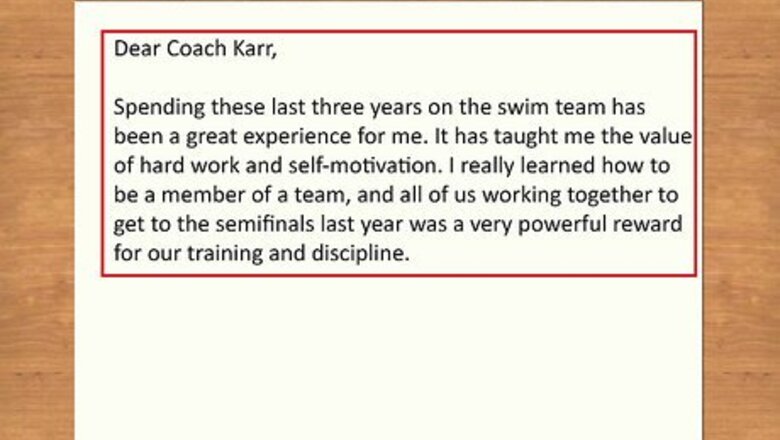
views
Writing the Body of the Letter
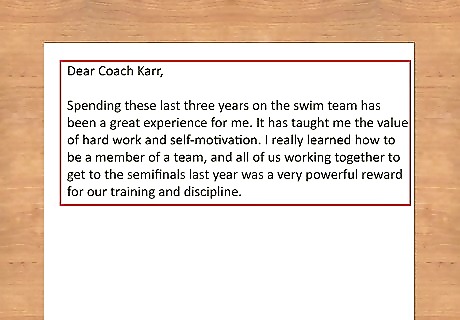
Develop the first paragraph. Be direct and immediately state the purpose of the letter. List the name of the team, how long you have been on the team, and your anticipated last day. Here’s a sample first paragraph: “After over a year on the team, it is with great regret that I must announce my resignation from the Pleasantville Lemon Trees Junior Lacrosse Varsity Squad, effective immediately.” The first paragraph does not have to be long. A couple of sentences is fine, unless you have more to communicate.
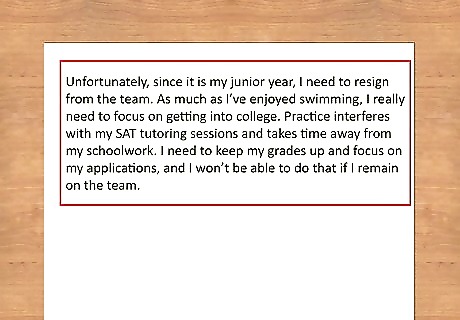
Develop the second and subsequent paragraphs. State why you are leaving using non-accusatory language. This means that you do not want to be disrespectful, sarcastic, or mean-spirited, regardless of what has occurred during your time on the team. While it is fine to be truthful, you should always remain positive. Include your reasons for leaving the team, but be honest. For example: “I need to go to a team where I’ll be able to get more playing time.” Mention what you liked about being on the team and any life lessons you learned. For example: “I enjoyed working with you, and I learned a lot under your tutelage. In particular, your comments on both my stick- and footwork have helped me greatly.” Many teams include photos of team members on marketing materials, especially on social media. If you don't want your image to be included in these materials in the future, state so in your letter. Be aware that some prior agreements may allow the team to maintain your image in marketing materials, however. Keep your letter as emotionless and factual as possible.
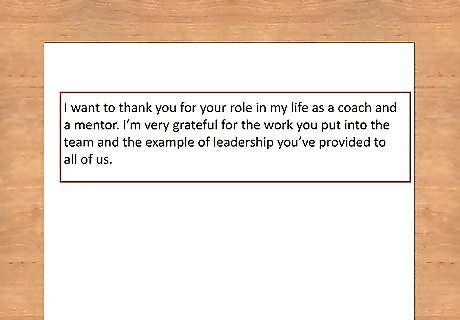
Develop the final paragraph. End your letter by communicating your appreciation for the coach. Remember to be truthful. You can always find something nice to say about a person. You never know when your paths may cross again in the future, and leaving things on good terms could be beneficial down the road. Here is an example: "Coach Allen, I want to thank you again for all your time and help in fostering my early junior lacrosse career." Include your willingness to help the team, if needed, before you depart. Only do this if it's something you're able to do. Don't make any commitments that you can't keep.
Formatting the Letter
Select the platform for writing the letter. You can either write the letter on your computer using the Microsoft Word software application or you can write the letter in an email. If you do not have a computer, you can hand write the letter, but this is not the best option and should only be used if you have absolutely no access to a computer. If you do not have a computer, you can always go to the library because many libraries have a computer center that is open to the public. Usually all you need is a free library card. While Microsoft Word is the most commonly used word processing software, some people also use Pages, which is a software application exclusive to Mac computers. If you hand write the letter, be sure to use good penmanship so that your letter is easy to read.
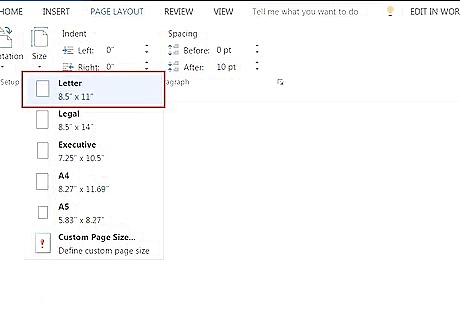
Select the paper. Choose the standard paper size, which is 8 ⁄2 by 11 inches (22 by 28 cm). Do not worry about the weight of the paper as long as you use basic printing paper. Usually what you have on hand will work just fine.
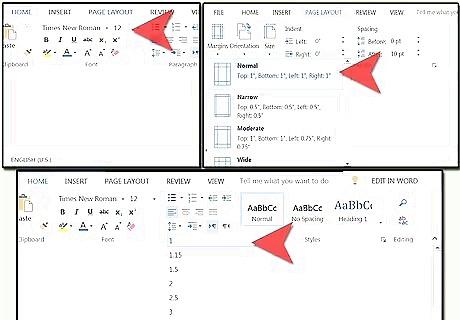
Establish the document layout. The top and bottom margins should be between 1 and 1 ⁄4 inches (2.5 and 3.2 cm). The right and left margins should be between 1 ⁄4 and 1 ⁄2 inches (3.2 and 3.8 cm). You can use the default margin settings included in most word processors, which is 1 ⁄4 inches (3.2 cm) on all sides (right, left, top, and bottom). Use an easy to read font, such as Times New Roman, Arial, Verdana, or Cambria, with a font size of 10, 11, or 12. You can select a different easy-to-read font if you have a preference. Single space the letter and place an extra line between paragraphs. You should also place an extra line after the address and salutation, however, there are four extra lines after the date. Your letter should not be more than one page in length.
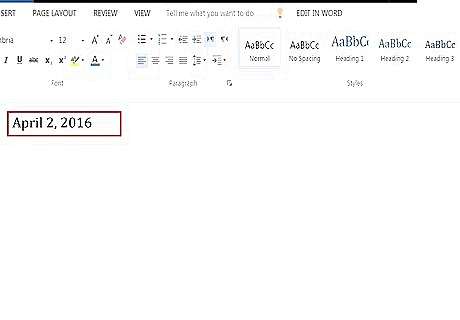
Add the date. Type or write the date you are creating the letter. The month should be spelled out and the day and year should follow: April 2, 2016.
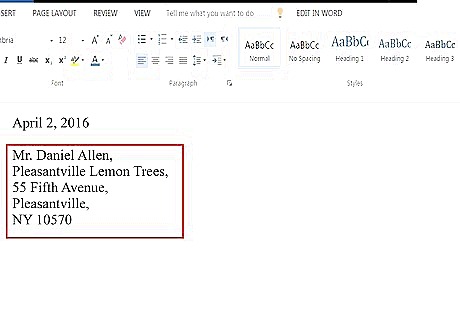
Add the recipient’s contact information. The address should include the recipients name, organization, street address, city, state, and postal code (Mr. Daniel Allen, Pleasantville Lemon Trees, 55 Fifth Avenue, Pleasantville, NY 10570). If the address is not available, you can leave it out and move on to the next step.
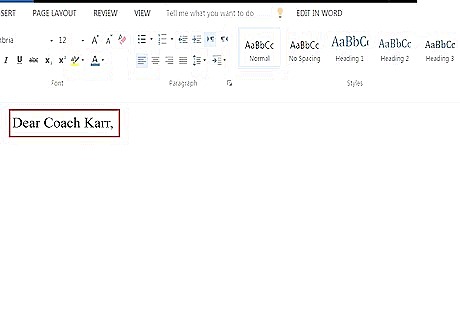
Add the salutation. Type or write "Dear Coach (last name)." Using this standard salutation, also called the greeting, is good because you want to maintain professionalism. Although “Dear” is appropriate within the context of a letter, it is not necessarily the best salutation if you choose to send your letter in the body of an email. Email messages tend to be less formal and call for a less formal salutation, such as “Hi Coach (last name).”
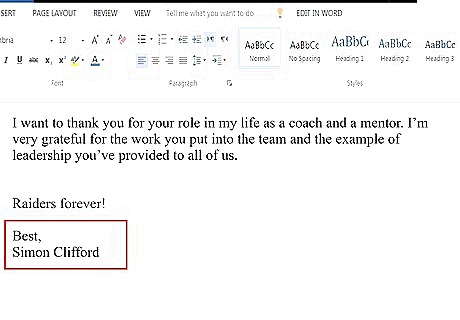
Add the closing. There are many options for the letter closing, but for this scenario, you should use "Sincerely," “Warm regards,” or “Best wishes” to demonstrate your sincerity or positive wishes for the coach and team.
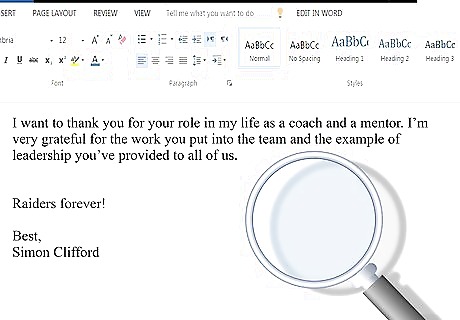
Proofread the letter. Anytime you write a letter you should proofread it to be sure that it is free of any errors. When you proofread the letter, read it out loud because you are more likely to identify errors when you speak and hear the words.
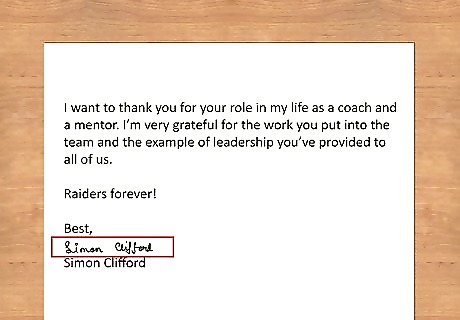
Print and sign the letter. Print out your letter and sign it with both your first and last name. If you are planning to send your letter by email, a handwritten signature will not be easy to add, nor is it necessary.
Sending the Letter
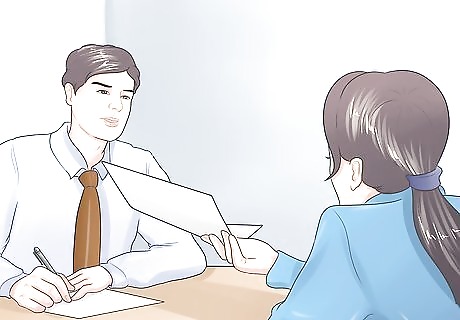
Deliver the letter yourself. Once you have finished writing your letter, there are many methods of delivery from which to choose. However, the best way is to deliver the letter in person. This will give you an opportunity to speak directly with the coach and answer any questions. You can hand the coach the letter after practice and have a conversation immediately following, or you can discuss the details at a later date.
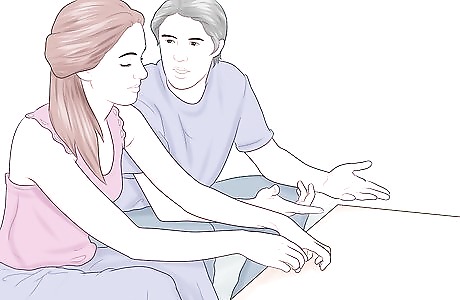
Ask someone to deliver the letter for you. If you do not want to personally deliver the letter, you can also have someone deliver the letter for you, as long as it is in a sealed envelope. Make sure that you can trust this person to deliver the letter. Don't choose someone who may lose or forget the letter.
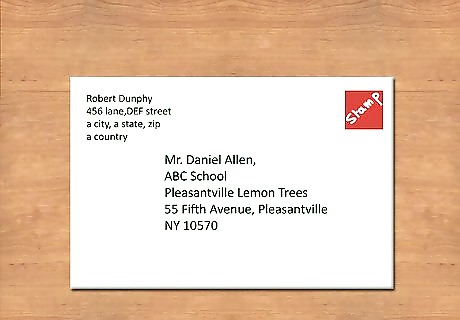
Send the letter by postal service. You can always send the letter by mail if you do in fact have an address for the coach. The best address to use is the address of the school or organization that coordinates the team’s activities. Avoid using the coach's personal home address, as this may come off as unprofessional.
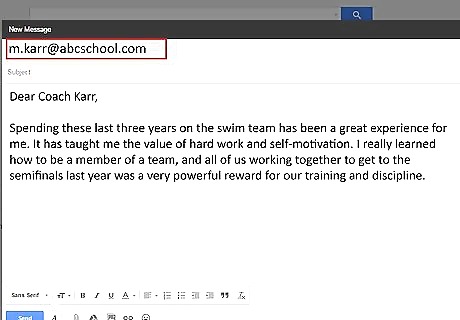
Send the letter by email. If you choose to send the letter by email, you can send it as a document attached to the email or by writing the content of the letter in the actual body of the email message. Put your name and team name in the subject. Don't use a casual title, like "Hey!" or "Hello."

Send a greeting card or thank you note card. Want to do something out of the norm and extra special? Often there is an assistant coach or other administrators who have been particularly helpful to you as a member of the team. You may consider providing a thank you note or greeting card to one or more of those individuals. This is a way of acknowledging a person’s kindness in a way that can be memorable and does not take a lot of extra effort or money. You can find inexpensive greeting cards and thank you cards at stores like Target and Walmart, as well as other retailers such as various dollar stores and grocery stores.
Making the Decision to Leave

Examine why you are leaving. When making an important decision, it is best to think about the facts surrounding your decision, such as why and when. This will give you an opportunity to ensure that you are making the right choice. Ask yourself the following questions: Why do I want to leave the team? When do I want to leave the team? For instance, will you wait until the end of the season or leave immediately.
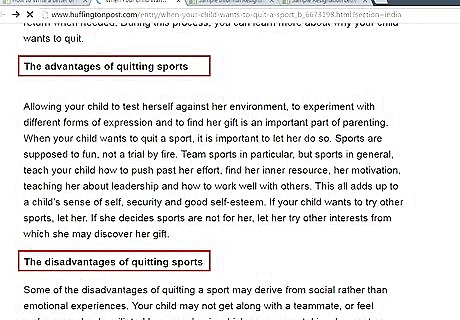
List the pros and cons. Grab a sheet of paper and pen or use an electronic notepad to list your answers to the questions below. This will help you to gain confidence in your decision. How will leaving the team positively impact me? (list all of the pros) How will leaving the team negatively impact me? (list all of the cons)
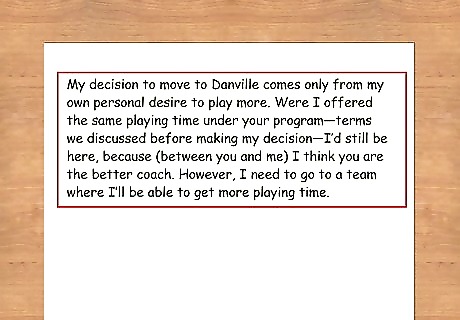
Assess the impact on your future. Beyond the pros and cons identified, ask yourself whether or not leaving the team could negatively or positively affect your future (such as your college career). If you are leaving to try another sport or to focus on schoolwork, you should feel confident about leaving because it will be beneficial to your future. If you are leaving because there is a difficult situation that you have not been able to handle, you may consider staying and getting assistance with resolving the problem.

Talk to a parent, teacher, or mentor. If you are having a hard time making a final decision, you can speak with an adult whose opinion you trust in order to hear another perspective. They may have ideas or thoughts that you have not considered.
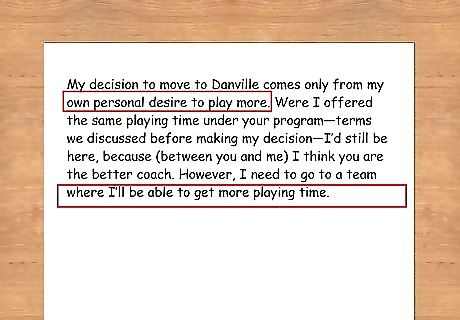
Identify a replacement activity. Will you have a new coach, team, and replacement activity that will provide similar or more benefits than those gained in the sport that you are leaving? It may not be a good idea to leave the sport and then have nothing else to do in your free time, or to leave the sport and spend your idle time sitting on the couch or playing video games. Your replacement activity should be of greater benefit to you in the short-term or long-term.



















Comments
0 comment